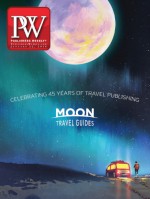Spencer Wise is the heir to a shoe-manufacturing dynasty that began five generations ago in New England. Today the family business is about producing goods in China, and, though Wise knows all about shoes, he’s chosen not to make them but to write about them.
I first heard about Wise’s debut novel, The Emperor of Shoes, in the PW offices. And if you’ve followed me at all, you know that a novel set outside of my world, on a subject about which I know nothing (making shoes is not buying shoes—there I have great expertise) is going to get my attention. The Emperor of Shoes is the story of a young Jewish American man, Alex Cohen, who takes over his father’s shoe factory in Guangdong and encounters the culture, the country, and Ivy, an activist seamstress who wants to unionize the workers being exploited under a corrupt system.
Boston is Wise’s hometown, and his father ran the family shoe factory in Amesbury until the 1962 Trade Expansion Act sent manufacturing overseas. Closing the factory in 1972 sent Wise’s father overseas as well and began Wise’s obsession with his father’s travels to Brazil, China, Taiwan, and Yugoslavia. Wise says that he always knew he wanted to write a book that combined the elements that dominated his upbringing. So in 2013 he went to work in the shoe factory in southern China that his father had contracts with. “I lived in the factory, I worked on the line—it was a real apprenticeship.”
Wise says he knows how to make a shoe from scratch, and in one of the novel’s early drafts, which he showed to Robert Olen Butler, his mentor at Florida State University, he had a 40-page section explaining the process. Butler had a clear opinion: “What makes you think anyone cares?” Wise explained that he was “channeling Melville—that passage in Moby-Dick where he describes building a ship?” But he cut the shoe making bit.
What Wise brings to a story of hot-button issues is a light hand, a mix of sensitive characters, a propulsive plot, and humor. When Alex comes to meet Ivy’s grandmother, he brings her “the hopelessly lame present of espadrille heels from the factory,” but realizes, “Better I should have given her a head of cabbage.”
For Wise, 2013 was about writing, researching, and interviewing people in China. “They accepted me because I was legitimately interested in the culture, and also I think they liked that I was Jewish,” he says. “They associate being Jewish with being hard working and successful, and the Chinese find this admirable.”
Wise had come to Florida State, where he’s a visiting lecturer, especially to work with Butler, and fortunately, Wise says, “he liked my writing.” More than that, when the manuscript for Emperor was finished in early 2016, Butler asked around about young agents looking for new clients. One of them was Duvall Osteen at Nicole Aragi, an agency with an impressive and diverse list of authors; one of three agents at the agency, Osteen had started six years ago as Nicole Aragi’s assistant. Butler called and sent Osteen the book. “I was flattered when Bob called,” she tells me. “He simply said, ‘There’s this kid, and he’s the best in my class.’ ”
Osteen had previously read a story of Wise’s, “The Farm,” about a Jewish boy from Boston meeting his Southern girlfriend’s parents in Georgia. “I’m from the South, and I still remember this scene at the dinner table where they are saying grace, holding hands, and at the end of the prayer, the father adds, ‘Shalom,’ ” she says. “I was thinking I should sign this guy up right now. Spencer finds your comfort zones and boots you out of them. I think of him as a less mean Philip Roth.”
She read the manuscript at the end of March 2016, and they started working together. “The novel had so much going for it: father-son relationship, coming of age, romance, and the world of Chinese factory workers, which is a world we never think about.” Despite all that, the novel didn’t sell on its first round out. After revisions, Osteen sent it to only one editor, John Glynn at Hanover Square Press, who told her, “Hold this for me—I’ll get right back to you.”
Hanover is a new imprint under Harlequin’s umbrella, formed in November 2016, with Peter Joseph as editor. Glynn arrived there in April 2017 after five years at Scribner, where he’d worked on an eclectic list of fiction and nonfiction. “It was a dream to get to shape a list from the ground up,” he says about his new gig.
The Emperor of Shoes was Glynn’s first acquisition. He was looking for the perfect book and is convinced he’s found it. “It’s fiction with a pulse,” he says, and “it’s a subject that is underrepresented in fiction—it felt timely and prescient.” (When he received the manuscript, he had just read about labor practices at a Chinese company that produces Ivanka Trump–branded shoes.) Glynn appreciated the book’s authenticity, that it was anchored by Wise’s experiences of China as a gweilo (a Cantonese slang term that literally means “ghost man”).
Glynn bought North American rights in May 2017 for ”a modest amount” (Wise was thrilled) and got first serial rights for an excerpt in Narrative magazine. The book pubs in June in the U.S. and July in the U.K. with No Exit Press. The publication of Emperor is a trifecta of beginnings: a debut novel, a new imprint, and a young agent. The stars converge.



 Volume 265
Issue 4
01/22/2018
Volume 265
Issue 4
01/22/2018





